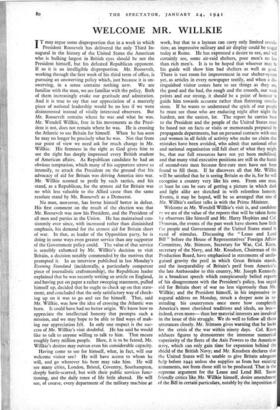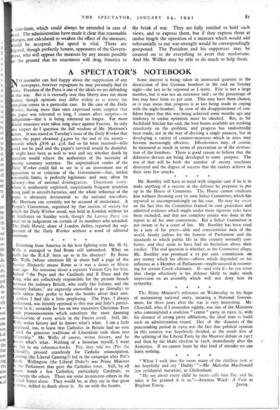WELCOME MR. WILLKIE
I T may argue some disproportion that in a week in which President Roosevelt has delivered the only Third In- augural in the history of the United States the American who is bulking largest in British eyes should be not the President himself, but his defeated Republican opponent.
If so it is an intelligible disproportion. Mr. Roosevelt, working through the first week of his third term of office, is pursuing an unswerving policy which, just because it is un- swerving, in a sense contains nothing new. We are familiar with the man, we are familiar with the policy. Both of them increasingly evoke our gratitude and admiration. And it is true to say that our appreciation of a masterly piece of national leadership would be no less if we were disinterested instead of vitally interested observers. But Mr. Roosevelt remains where he was and what he was. Mr. Wendell Willkie, free in his movements as the Presi- dent is not, does not remain where he was. He is crossing the Atlantic to see Britain for himself. When he has seen he may no longer be precisely what he was. Not that from our point of view we need ask for much change in Mr. Willkie. His firmness in the right as God gives him to see the right has deeply impressed every British student of American affairs. As Republican candidate he had an obvious temptation, which many of his supporters strove to intensify, to attack the President on the ground that his advocacy of aid for Britain was driving America into war. Mr. Willkie scorned to profit by such tactics, and his stand, as a Republican, for the utmost aid for Britain was no whit less valuable to the Allied cause than the same resolute stand by Mr. Roosevelt as a Democrat.
No man, moreover, has borne himself better in defeat. His first comment on the result of the election was that Mr. Roosevelt was now his President, and the President of all men and parties in the Union. He has maintained con- sistently ever since, with increased rather than diminished emphasis, his demand for the utmost aid for Britain short of war. In that, as leader of the Opposition party, he is doing in some ways even greater service than any supporter of the Government policy could. The value of that service is sensibly enhanced by Mr. Willkie's decision to visit Britain, a decision notably commended by the motives that prompted it. In an interview published in last Monday's Evening Standard (incidentally, a particularly competent piece of journalistic craftsmanship), the Republican leader explained that he was recently writing an article on England, and having put on paper a rather sweeping statement, pulled himself up, decided that he ought to check up on that state- ment, and concluded that the only satisfactory way of check- ing up on it was to go and see for himself. That, said Mr. Willkie, was how the idea of crossing the Atlantic was born. It could have had no better origin. We know how to appreciate the intellectual honesty that prompts such a mission, and we may hope to be able to find ways of mak- ing our appreciation felt. In only one respect is the suc- cess of Mr. Willkie's visit doubtful. He has said he would like to talk to anyone willing to talk to him. That means roughly forty million people. Here, it is to be feared, Mr. Willkie's desires may outrun even his considerable capacity.
Having come to see for himself, what, in fact, will our welcome visitor see? He will have access to whom he will, and go wherever his bent may take him. He will see many cities, London, Bristol, Coventry, Southampton, deeply battle-scarred, but with their public services func- tioning, and the daily tenor of life little altered. He will see, of course, every department of the military machine at work, but that to a layman can carry only limited convic- tion; an impressive military and air display could be staged today at Rome. He has expressed a desire to see, and will certainly see, some air-raid shelters, poor men's no less than rich men's. It is to be hoped that whoever may be his guide will show him bad shelters as well as good. There is vast room for improvement in our shelter-system yet, as articles in every newspaper testify, and when a dis- tinguished visitor comes here to see things as they are, the good and the bad, the rough and the smooth, our weak points and our strong, it should be a point of honour to guide him towards accurate rather than flattering conclu- sions. If he wants to understand the spirit of our people he must see those who are enduring night after night the hardest, not the easiest, lot. The report he carries back to the President and the people of the United States must be based not on facts or visits or memoranda prepared by propaganda departments, but on personal contacts with men and women in all fields of activity who make no claim that mistakes have been avoided, who admit that national effort and national organisation still fall short of what they might be, that our full resources have not yet been mobilised, and that many vital executive positions are still in the hands of second-rate men because first-rate men have not been found to fill them. If he discovers all that Mr. Willkie will be satisfied that he is seeing Britain as she is, for he will recognise a country very like his own. From one man, at least he can be sure of getting a picture in which dark and light alike are sketched in with relentless honesty. Events, it may be hoped, will be so arranged that one of Mr. Willkie's earliest talks is with the Prime Minister.
Welcome as Mr. Wendell Willkie's visit is, and confident PC we are of the value of the reports that will be taken home 1:.y observers like himself and Mr. Harry Hopkins and Col. Donovan, the events of the past week have shown how little fie people and Government of the United States stand in need of stimulus. Discussing the "Lease and Lend Bill " before the House of Representatives' Foreign Affairs Committee, Mr. Stimson, Secretary for War, Col. Knox, secretary of the Navy, and Mr. Knudsen, Chairman of the Production Board, have emphasised in statements of undis- guised gravity the peril in which Great Britain stands, and the inseparability of Britain's peril from America's; the late Ambassador to this country, Mr. Joseph Kennedy, in a broadcast speech which conspicuously belied reports of his disagreement with the President's policy, has urged aid for Britain short of war no less vigorously than Mr. Willkie; and the President himself, in his impressive in- augural address on Monday, struck a deeper note in re- minding his countrymen once more how completely America's most cherished traditions and ideals, no less— indeed, even more— than her material interests are involved in the issue of this struggle. We do well to follow all those utterances closely. Mr. Stimson gives warning that he looks for the crisis of the war within ninety days. Col. Knox adduces figures to demonstrate the immense numerical superiority of the fleets of the Axis Powers to the American navy, which can only gain time for expansion behind the shield of the British Navy; and Mr. Knudsen declares that the United States will be unable to give Britain adequate help before 1942 unless she supplies us from her existing armaments, not from those still to be produced. That is the supreme argument for the Lease and Lend Bill. Some friendly critics like Mr. Willkie himself, desire amendment of the Bill in certain particulars, notably by the imposition of dine-limit, whigh could always be extended in case of eed. The administration have made it clear that reasonable hanges, not calculated to weaken the effect of the measure, .ould be accepted. But speed is vital. There are igoted, though perfectly honest, opponents of the Govern- ent, who will oppose the measure by any means possible n the ground that its enactment will drag America to the brink of war. They are fully entitled to hold such views, and to express them, but if they express them at undue length the operation of a measure which would add substantially to our war-strength would be correspondingly postponed. The President and his supporters may be counted on to do everything to avert that misfortune. And Mr. Willkie may be able to do much to help them.































 Previous page
Previous page